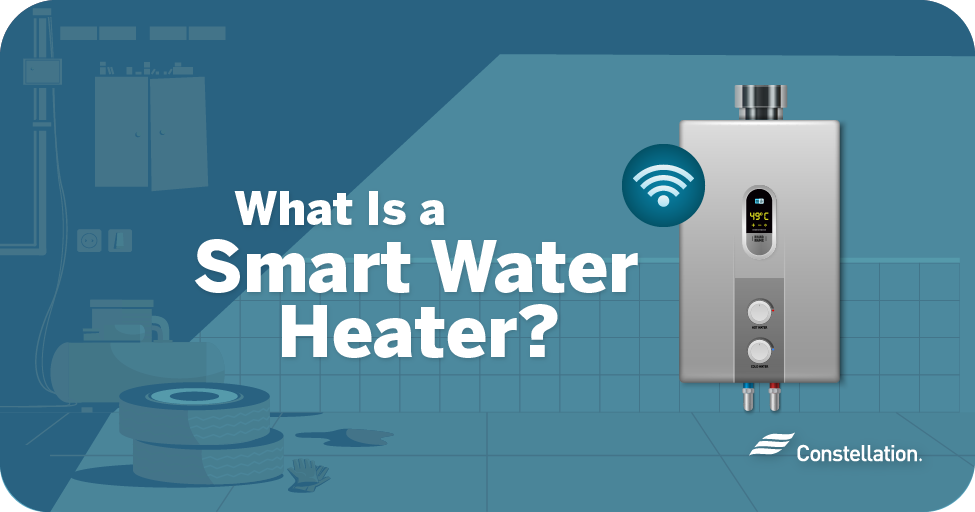Your water heater is one of the top energy-consuming appliances in your home, accounting for 14-18% of your utility bill. You might not think much about it, but upgrading your hot water heater is worth considering. In replacing your current one, you may wonder: What is a smart water heater?
How does a smart water heater work?
A smart water heater is an appliance providing hot water throughout your home controlled through Wi-Fi or Bluetooth connections to smartphone apps, smart assistants or a smart hub like Constellation Connect. You control how and when they operate and use smart controls and sensors to monitor usage patterns to optimize energy consumption.
Different smart water heaters by fuel type
Wi-Fi water heaters or a smart water heater run on gas, liquid propane or electricity. Each option works differently and you will want to consider gas vs. electric water heater pros and cons.
Smart electric water heater
A smart electric water heater uses high-voltage rods in the center of the tank to heat water. Hot water is drawn off the top and distributed to faucets and appliances. A smart electric water heater is affordable, but it will cost more to operate. You also might find it takes longer to heat your water. It is, however, a clean and safe option.
Smart natural gas water heater
A smart gas water heater has a gas-fired burner at its base that heats water, which rises to the top of the unit where it is distributed through your home. A smart gas water heater heats quickly and economically. Of course, if you don’t have gas hookups in your home, a smart gas water heater is not a good option.
Smart liquid propane water heater
A smart hot water heater that runs on liquid propane uses the same process as a smart gas water heater. It heats water quickly and provides water at a consistent temperature. It is an ideal option if you don’t have a gas hookup and want an alternative to a smart electric water heater. You will need to buy propane, hire a plumber, and make sure the system is properly vented.
Other types of smart water heaters
In answering the question of what is a smart water heater, look beyond the type of energy used, You have tank, tankless or hybrid options.
A tankless heater heats water on demand as it travels through its pipes. It is highly efficient, running only when hot water is needed. They have limits to how much water they can produce at once, which might not be enough if you shower while running a dishwasher.
Between a tankless vs. traditional water heater, hybrid smart water heaters give you the best of both. It has a small tank for storing hot water for times of high demand.
What are the benefits of using a smart water heater?
If you are investing in home automation, smart showers, along with a smart water heater, can save you money, while giving you many other benefits as you set up your smart home.
1. Time of use control
Instead of running it all day, you can set it to heat water only when you need it. If you take a shower every morning before work, set it to have the water ready then, and shut off while you are gone all day. If you take another shower following your after-work gym visit, program it to kick back on in the evening.
2. Water temperature control
A comfortable water temperature for a shower is lower than that needed for the heavy cycle on your dishwasher. Program your hot water heater to run only long enough to provide water for those activities, rather than have it maxed out all the time.
3. Leak detection
Avoid the cost of a flood in your home and prevent extensive damage with sensors that give an early warning to any problems.
4. Lower electricity bill
Running only when needed and at the right temperature, your smart hot water heater can optimize its operation for serious savings on your gas or electricity bill.
5. Longer lifespan
Smart water heaters run more efficiently than traditional models, meaning they also tend to last longer. This means you’ll save money on replacement costs, as well as lower your carbon footprint by keeping waste out of the landfill.
How much do smart heaters cost?
The actual costs for a smart water heater vary by brand, size, features, and location. Smart electric water heaters cost less than gas or liquid propane ones.
Installation costs are another aspect of how much smart water heaters cost. Smart electric hot water heaters are relatively easy to install, but you will need a skilled plumber to safely install a gas or propane unit. A tankless water heater may require an upgrade to your natural gas inlet.
Consider longevity. A tankless water heater will last longer than 20 years, while a traditional one will need replacing in 10 to 15 years.
The last cost to consider are operation costs. Propane and smart gas water heaters are cheaper to run. A tankless hot water heater can save you 24% to 34% off your energy costs. You can explore energy saving tips for your bathroom to look for other ways to trim your power bill.
Are smart water heaters worth it?
If you are seeing signs your water heater is going to fail, you are likely going to find replacing it is a better option than repairing your old one. Given how much energy these appliances consume and how important hot water is to your comfort and health, these little-considered appliances hiding in closets and basements deserve your real consideration.
